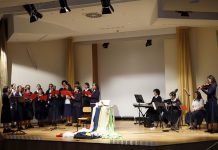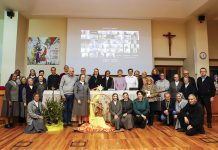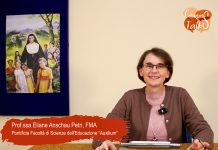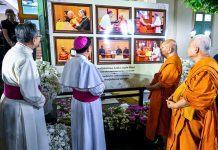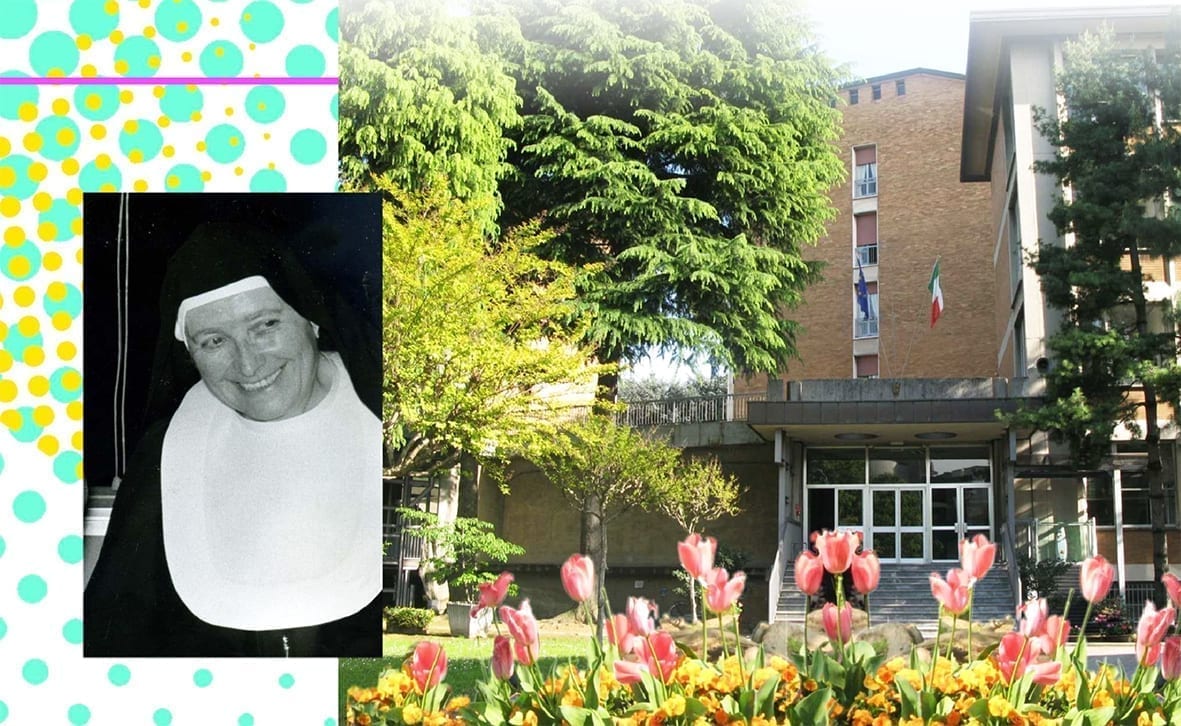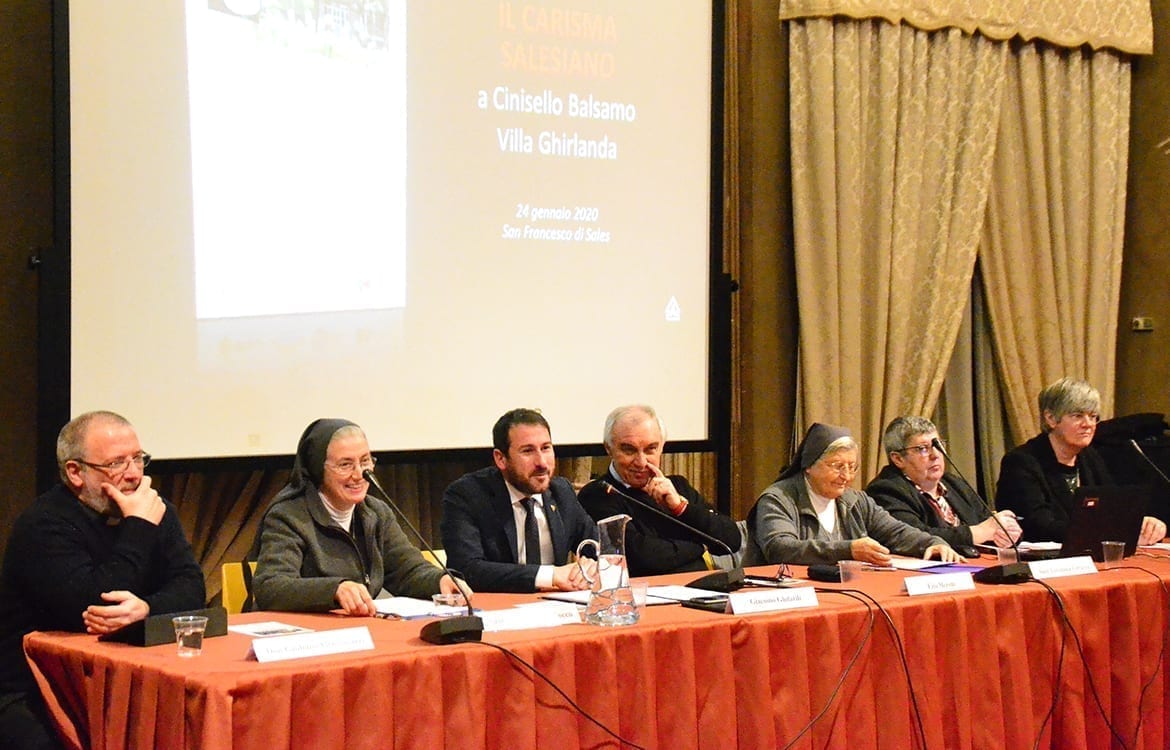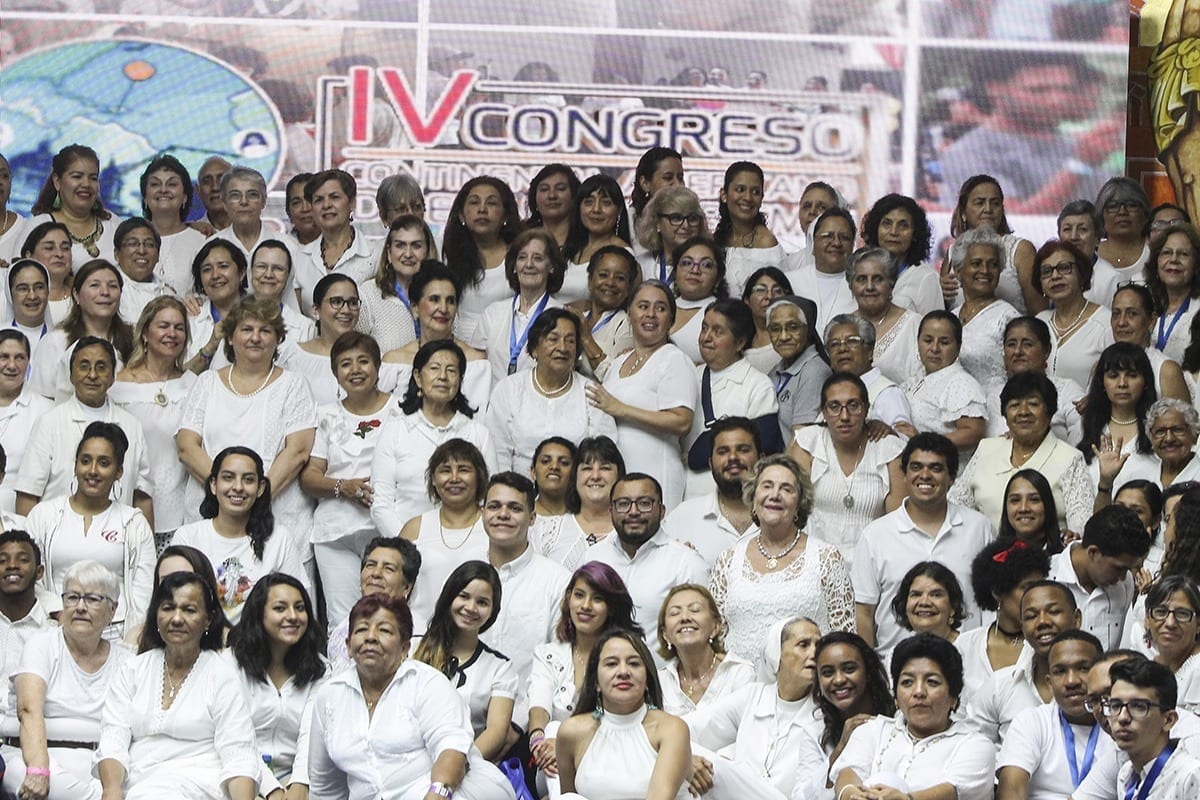Cinisello Balsamo (Italy) The Salesian Charism was the topic of the Round Table organized at Villa Ghirlanda in Cinisello Balsamo (Milan), on 24 January 2020 with the patronage of the Municipal Administration.
Present at the speakers’ table were: the Mayor of Cinisello Balsamo, Dr. Giacomo Ghilardi; the Provincial of the Salesian Province of Lombardy and Emilia (ILE) of the Salesians of Don Bosco, Fr Giuliano Giacomazzi; the Provincial of Holy Family Province (ILO) of the Daughters of Mary Help of Christians, Sister Maria Teresa Cocco; Sister Loredana Corazza, member of the Association of Salesian History Curators (ACSSA); and Sister Carla Carelli, Head of CIOFS/FP Mazzarello of Cinisello Balsamo for relations with the territory.
The motivation for the meeting as stated in the Letter of Invitation from the Mayor of Cinisello Balsamo and the Provincial of ILO was as follows:
“Salesian commitment in the formation and education of the young during many years of presence in the area represented and represents a significant contribution for the growth of the community of Cinisello Balsamo. To remember this journey shared with the students, the alumni, their families, parishes, institutions, and entrepreneurs, the Daughters of Mary Help of Christians, with the collaboration of the Municipality of Cinisello Balsamo, organized a time of discussion and study on the theme ‘The Salesian Charism in Cinisello Balsamo’, with a particular focus on the figure of Sister Iside Malgrati, founder of Mary Mazzarello Institute.”
In his opening greeting, the Mayor, a past-pupil of the Mazzarello School, recalled with pleasure his time as a student and the lessons he received. “I learned that the word THANK YOU is fundamental in life as is education to responsibility. And now I am aware that it is all actual, in spite of the changing epochs.”
Fr. Giuliano Giacomazzi began by quoting a phrase of Don Bosco, “The good is to be done well,” which indicates the importance of working for the young with intelligence, appropriate for the times. “Loving the young is not only a question of good will. Teaching a trade, in Don Bosco’s style, is restoring dignity to the young, giving them the possibility of discovering the gift they are for themselves and for society, valuing the energy they have.”
The Provincial, Sr. Maria Teresa Cocco, spoke of the Salesian ‘feminine’ charism, introducing the figure of Sr. Iside Malgrati, who in 1963 gave life to the Mazzarello Institute. She was appointed by the FMA Mother General, Sr. Angela Vespa, who entrusted to her the task of implementing at Cinisello Balsamo “a scholastic and professional complex for the education of female youth,” from Kindergarten to job placement. “She was attentive to society and to the world of work in the years of the economic boom, but was also intent on giving an integral education to the young girls, to make them grow in acquiring skills. As women, they had to feel they were citizens in all respects. There was no place for victims or estrangement, passivity or renouncement, but only for creativity and being enterprising, capable of living in their area, but with the awareness of being citizens of the world.”
Sr. Loredana Corazza illustrated, also by using photo testimony, the life and work of Sr. Iside Malgrati, born at Giubiano (VA) on 27 July 1904, and died at Cinisello Balsamo (MI) on 29 October 1992. Starting from her Commercial Start-up Diploma, she obtains the qualification for teaching at the Magisterial Schools of History, Philosophy, and Pedagogy. The students appreciate her competence, attentiveness in the preparation of lessons, but above all the enthusiasm, sensitivity, and the attractive Christian and Salesian witness that characterized her lessons. Her foresight and ability to grasp the ‘signs of the times’ led her to achieve the goal of building a European School, where languages were taught (by teachers of their mother language) from Kindergarten.
She also opened an Art Institute, which would assist the publication of the Primavera Magazine, dedicated for the first time to adolescent and pre-adolescent girls, with the aim of educating, forming, and promoting the woman of the future. Sister Isis, in fact, is the soul, the mind, and the operative arm of Primavera, the first issue of which comes out on January 31, 1950, gaining unanimous approval for the typographical innovations and for the quality of the articles, as evidenced by this letter from Mother Angela Vespa:
“Reverend and dearest Sr. Iside, how can I tell you my gratitude for the first issues of Primavera? I tell you sincerely that it had the most festive welcome from everyone and surpassed all expectations. Few thought that it could have presented itself in such a beautiful, cheerful, modern style. I was given the task of taking it to the Reverend Superiors and, I can tell you, it was a surprise for everyone. Reverend Fr. Ziggiotti, after leafing through it, said: – ‘If you have the courage to keep it at this height, you are truly at the forefront’.” (AGFMA, 333 – 01 – 03 – 01, letter from Mother Angela Vespa, Turin January 25, 1950)
Mazzarello Institute was a school open to the world of work, with Courses for Company Secretaries, with teachers of the mother language for learning English and Russian, the basic languages for the commercial rapports of the industries of the area that opened abroad. It was a school that knew how to renew itself by opening in 1981, courses for Bakery and Pastry.
Sr. Iside Malgrati had numerous civil awards bestowed on her and in 1988, she received the ‘Spiga d’oro’, the highest honor of the Municipality of Cinisello Balsamo (MI).
Sr. Carla Carelli, current head of relations with the territory of CIOFS/FP of Mary Mazzarello School, recounted her experience as a past-pupil and FMA growing up with life models such as Sister Iside and other FMA of the times. She concluded by stressing that, with the current CIOFS/FP Courses, ‘The Mazzarello’ – as the school is commonly called – is not only a memory but is still today, a place capable of forming ‘good Christians and honest citizens’ as Don Bosco taught.



